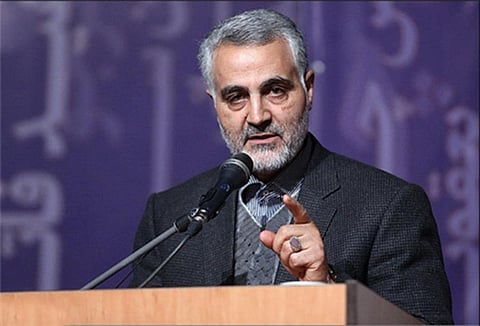Iraq risks becoming a proxy battlefield
Tensions will rise unless an exit strategy is found in the aftermath of Soleimani killing

Rising hostilities between Iraq’s closest allies — the US and Iran — are playing out on its soil. While the demise of Maj. Gen. Qasim Soleimani, the father of the Shiite axis stretching from Iran to Lebanon, merits few tears in the West, it has thrown Iraq and the region at large into unchartered territory.
Iran and the US have been barking at each other since the 1979 Islamic Revolution but despite endless threats the battle has been waged asymmetrically. For 40 years both sides have avoided crossing the line towards an all-out conflict until today when as each day passes they are boxing themselves in.
America’s Western allies, in particular Britain, France and Germany, are angry that unlike Israel they were not consulted in advance on the drone strike that killed Soleimani and Abu Mahdi Al Muhandis, a senior commander of the Hashd Al Shaabi — an umbrella group made up largely of Shiite militias subsumed into Iraq’s security forces. Secretary of State Mike Pompeo says he finds their reaction disappointing.
De-escalate tensions
Europe and the United Nations not to mention many of Iraq’s neighbours close to the frontlines are urging both sides to de-escalate tensions but that may be easier said than done. Viewed by Iranians as a hero who kept Daesh far from their doors and admired by Shiite Iraqis for his role in dismantling the group’s so-called Caliphate, his influence does not end with his death and could well be magnified.
The irony is that neither side is angling for war but unless one side or both comes up with an exit, war that would negatively impact the entire Middle East in terms of investment and tourism looks inevitable. In the meantime, American politicians and political experts are having difficulty understanding Trump’s endgameLinda S Heard
Even if the Iranian powers that be were inclined to shrug their shoulders and carry on regardless, domestic pressures require that they must exact revenge. Far from being a deterrent designed to keep Americans safe, as President Donal Trump and Secretary of State Pompeo are billing the assassination, the opposite is the case at least in the short term. Iran’s supreme leader threatens “harsh retaliation”.
Iraq’s militia Kataib Hezbollah issued an ominous statement warning Iraqi security forces to stay away from US bases beginning last Sunday. Americans are leaving Iraq in droves. US embassies, bases and facilities throughout the region are on the highest alert and an additional 3,000 US troops have been dispatched to the area. And if US intelligence officials are right that Soleimani had masterminded “imminent” attacks on US interests (the official casus belli that lends legality to the Trump administration’s decision) why should one assume that his absence automatically renders those advanced plans to the trash can.
Fight against Daesh
For its part, Iraq has termed the assassination “an act of war” and a gross infringement of Iraqi sovereignty. There are loud calls within Iraq’s political spectrum as well as on the street for the withdrawal of the US military from the nation’s soil amid accusations that the Pentagon has overstepped its mandate that is specific to aiding Iraq in its fight against Daesh.
Many Iraqis that took to Baghdad’s Tahrir Square to protest Iranian influence over Iraq, among other things, are now calling for their country’s true independence free from both currents. Many more are openly siding with Iran including caretaker Prime Minister Adel Abdul Mahdi and former prime minister Nouri Al Maliki who along with other prominent political figures attended the massive funeral procession to honour the slain. Iranians and Iraqis of all sectarian affiliations have temporarily set aside their differences to unite behind their respective flags.
Trump is in no mood to climb down either. He has warned Iran that the US military has 52 Iranian sites in its sights that will be hit “very hard” should Iran carry through its promised retaliation against US assets. If rocket attacks on Baghdad’s Green Zone and an air base housing US troops late on Saturday are anything to go by, Iran or its proxies will follow through on their threats. Wouldn’t that leave President Trump obliged to greenlight multiple strikes on Iran else lose face?
The irony is that neither side is angling for war but unless one side or both comes up with an exit, war that would negatively impact the entire Middle East in terms of investment and tourism looks inevitable. In the meantime, American politicians and political experts are having difficulty understanding Trump’s endgame. What is his strategy? Does he have a goal? Does he envisage Iran’s leadership returning to the negotiating table cap in hand? Or has this man who has always been anti-war and swore to bring US troops home from the Middle East changed his mind?
— Linda S. Heard is an award-winning British political columnist and guest television commentator with a focus on the Middle East.


